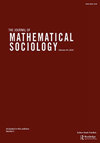This journal publishes articles in all areas of mathematical sociology. It also welcomes papers in areas of mutual interest to sociologists and other social and behavioral scientists, and papers which may encourage fruitful connections between sociology and other disciplines. Articles dealing primarily with the use of mathematical models in social science, the logic of measurement, computers and computer programming, applied mathematics, statistics, or quantitative methodology are welcome insofar as they make some contribution to the understanding of substantive social phenomena. The editors will consider speculative articles that are not mathematical but are sufficiently precise, general, and abstract to stimulate mathematical treatment of problems that have heretofore been dealt with only verbally. Reviews of new or developing areas of mathematics and mathematical modelling which may have significant applications in sociology will also be considered. The Institute of Scientific Information Journal Citations Report for 2002 ranks Mathematical Sociology 43rd out of 93 journals in Sociology and 19th out of 29 journals in Mathematical Methods (Social Science), with an impact factor of 0.5.
